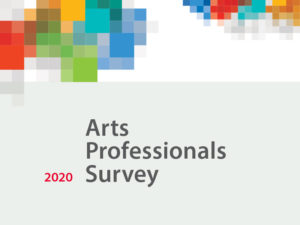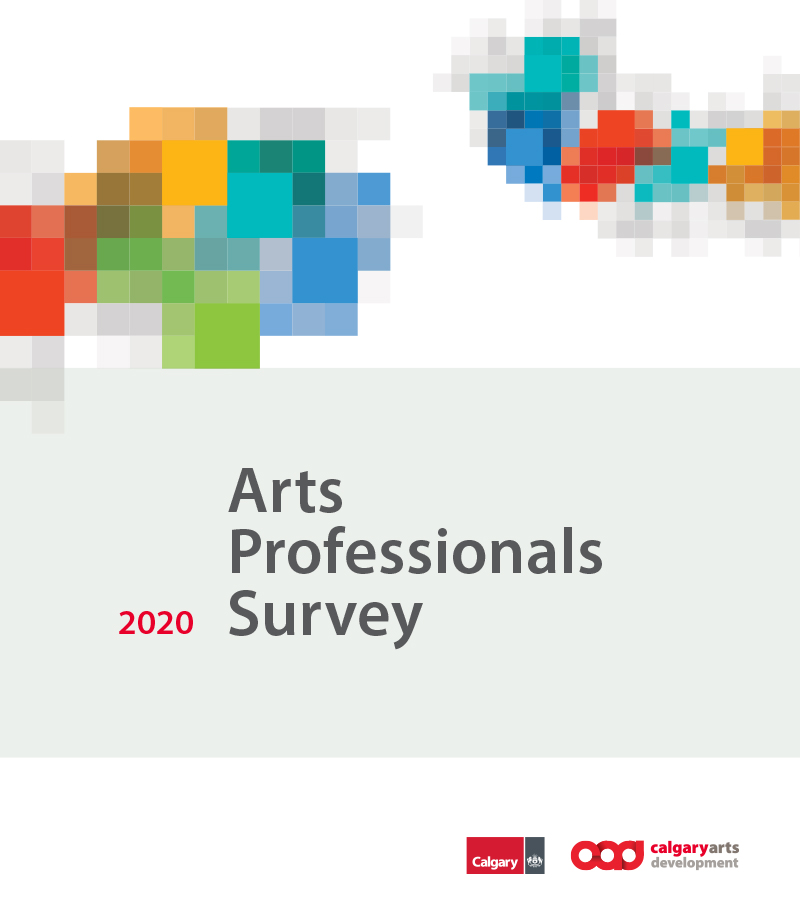Arts Professionals Survey
In September 2020, Calgary Arts Development undertook a survey of arts professionals to better understand their status in Calgary. The online survey was an expanded update to the 2017 Calgary Arts Professionals Survey, building upon past survey questions and findings as well as asking new questions relevant to the COVID-19 pandemic and to equity, diversity, inclusion, and accessibility.
The survey asked questions related to the following topics: individuals’ careers, finances, health and well-being, housing, spaces and resources for artistic practice, perceptions and participation in community, the impact of COVID-19, as well as basic demographics. Survey questions sought to better understand how gender, ethnicity, and physical ability relate to the living and working conditions of artists.
The survey sample comprised individuals who self-identified as professional artists, arts administrators, arts educators, avocational or amateur artists, and/or other arts professionals. A total of 828 useable responses were submitted (an increase from 721 useable responses in 2017), resulting in a survey confidence level of 95%.
To better understand the experiences of Calgary artists, focus groups were also conducted to understand how COVID-19 affected the lives and livelihoods of the arts and culture sector, of which key findings can be found in the focus group summary. With that said, the following document contextualizes survey results with support from these other studies and refers to them frequently in areas where gaps in knowledge exist.
This survey and the subsequent focus groups were completed relatively early in the pandemic, which likely informs the responses to almost all of the survey questions. Better tools to understand the depth and length of the pandemic impact need to be developed to understand the type and levels of aid needed to assist in the recovery of the sector.
Key Findings
COVID-19 impacts everything. The arts have been the hardest hit industry and will likely be the last to recover. Clearly the pandemic has impacted artists’ ability to earn a living, their ability to create art, their ability to present their creations, and their perceptions of Calgary.
Over 70% of arts professionals reported that their ability to generate self-employment income was reduced. Over half of arts educators also reported that contract and freelance work was cancelled entirely. While CERB and CRB were the most consistent sources of income some arts professionals have ever received, the nature of the gig economy can make it difficult for many to provide the correct qualifications for government intervention. Only 5% of arts professionals reported feeling financially secure during the pandemic.
Arts professionals are struggling financially, more than ever. In the past, most survey respondents reported earning low individual and household incomes but never at levels now being reported. 57% of arts professionals report earning an income under $35,000 per year, much lower than the Calgary average of $60,244. In 2020, 75% of family incomes fell below the Calgary median, a continuing decrease in household income for those working in the arts.
There is a lack of available work. In addition to financial challenges, arts professionals reported that it can be difficult to find work within the sector. 97% of arts professionals reported a need for more employment opportunities. No respondents indicated that there were enough or that fewer opportunities were needed.
Arts professionals are no longer happy in Calgary. In the past Arts professionals had a more positive view of Calgary. When it comes to being a practising professional artist in Calgary, in 2017 57% agreed that Calgary was a good place to be an artist. In 2020 that number dropped by almost half with now only 30% of arts professionals agreeing that Calgary is a good place to be an artist.
In 2017, 77% agreed that Calgary has a strong and vibrant arts scene, whereas only 49% of respondents felt that way in 2020, a 28% drop. In 2017, over half of respondents (55%) described Calgary’s arts and culture offerings as being of world-class calibre, but now only 37% share that enthusiasm for the work being produced in Calgary. While only 48% of respondents in 2017 felt that Calgary was supportive of their work, that sentiment continues to erode to only 31% in 2020.
The desire to leave Calgary is high. One impact of low income and negative perceptions is that 24% of survey respondents anticipated moving away from Calgary in the next two years.
The demographic impact on working conditions is deeply problematic. Following the completion of the 2017 survey, Calgary Arts Development was committed to better understanding the working conditions of arts professionals with non-dominant identities.
For those individuals who report having a racialized identity, 66% reported having experienced racism as part of their work. Over 80% of those who have experienced racism as part of their work reported that they were also compensated poorly for their work. Over half of racialized artists (51%) reported having experienced race-based workplace harassment when working for an organization either on a contract basis or as a permanent employee. Women were far more likely to have experienced race-based workplace harassment, with 59% of women reporting this harassment compared to only 29% of men. In most cases arts professionals reported there was nobody to report this harassment to.
Of arts professionals that do not identify as male, 51.5% reported that when working with an organization either as an employee or a contractor they have experienced gender-based workplace harassment.
For those individuals who report having a medical disability, over half (51%) reported having experienced ableism in some part of their work as an arts professional, including when presenting their work or trying to access resources.
There isn’t enough time to make art. Most arts professionals only reported one to four hours of creation time per day. Over half (56%) of arts professionals reported a lack of time available for creative reflection or incubation and 62% reported that they needed more time to create.
The high cost of education is affecting professional advancement. The largest burden in advancing artistic skills was the financial cost of such advancement. Over two-thirds (67%) of arts professionals reported that they did not have the money to advance their artistic skills. These gaps in education need to be further addressed through close examination of the following factors: the cost of schooling and professional development, varying intersectionality, lack of recognition of non-Canadian experience, and structural racism.
Thanks
Calgary Arts Development acknowledges and appreciates the participation of all the arts professionals who participated in this survey and participated in the focus groups, especially during these difficult times. While time-consuming, the responses help provide a better understanding of the conditions for arts professionals in Calgary and information on how best to serve them, enabling all Calgarians to live full and creative lives.
Supplementary Reports & A Deeper Dive
In addition to the Arts Professionals Survey report, three additional reports have been completed. These reports provide a much deeper dive into the following topics, often providing context from larger more academic conversations taking place simultaneously on the issues explored in the survey:
APS Summaries: Discrimination PDF
This report focuses on the qualitative responses provided based on the experiences of discrimination faced by racialized, gender diverse, or disabled arts professionals.
APS Summaries: Savings & CERB PDF
This report focuses on the qualitative responses provided by arts professionals related to the ability to generate savings, and the impact of the CERB program during the pandemic.
Focus Group Summary PDF
This summary focuses on the specific responses provided during a series of supplementary focus groups hosted with arts professionals. We realize that a survey can only say so much, so in addition to the survey two focus groups were conducted to explore the following topics: savings and debt, CERB, and the impact of COVID-19. This report summarizes the findings from those groups.
Open Data
Calgary Arts Development is committed to providing open data. Aggregated data and the full question list from this survey is available upon request at impact@calgaryartsdevelopment.com.
Download the full publication:

